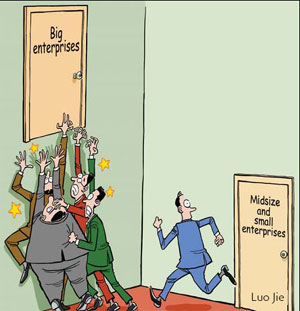Small firms offer plenty of rewarding jobs
By Takao Nakazawa (China Daily)
Updated: 2008-03-13 07:24
Updated: 2008-03-13 07:24
Spring is graduation season, the time when students preparing to enter the workplace, and many are filled with a sense of hope and anxiety. When former students contact me six months or a year later to tell me they are doing well, I feel relieved.
When I meet them, many say that even though they are under a lot of stress and find work difficult, they are happy because they have developed a good rapport with their superiors and colleagues. This has nothing do to with the size of the companies they work for.
The current employment situation is said to be a "sellers' market" for new university graduates.
However, part-timers and non-regular workers now comprise one-third of the nation's work force. There is a wide class distinction growing between full-time regular workers and those in other categories.

I am familiar with the situation facing small to medium-sized businesses, and I believe that some aspects cannot be explained from the macroeconomic view of "structural change of Japanese employment relations" alone. Many factories with 20 to 100 employees these days in fact have an acute shortage of full-time employees.
People have a negative image of small and midsize companies, believing they are struggling to stay afloat. But each one is different. It is dangerous to lump them together and discuss them in the abstract based on generalized data.
Some small companies specialize in making gears for machines, molds for the internal parts of cellphones or nozzles by boring tiny micron-size holes in super-hard materials.
I often interview officials of such companies. I find myself admiring the high level of technological expertise and skills these firms employ.
Companies like these that have operated for 20 to 30 years have developed a pool of competent workers with very high skills necessary to society. Personally, I believe such small and midsize businesses underpin Japan's international success. In my book Sugoi Seizogyo (Outstanding Manufacturers), I described this in great detail.
And I tell all the young people I know hunting for full-time jobs this: "Do not rely on first impressions. Just because you have never heard of a company or the fact that it is housed in a small building is no reason to reject a job interview with the company."
Students should meet with the presidents of companies that have job potential. They should ask many questions, such as how many employees have worked with the firm for longer than 10 years or 20 years. Ask if they still have older employees. The answers will tell the job hunter much about whether this is a good company to work for.
Another important factor is perseverance. It takes a long time for a worker to acquire the skills needed to perform competently.
Today, it is not uncommon for casual workers to register with temporary job placement agencies and then to sit back and wait for their cellphone to ring with a job offer.
That may be an easy way to make quick money, but it will not offer the opportunity to acquire skills and learn new technologies so a worker can land a stable job later on. In metal processing, for example, it takes from six months to a year to develop a basic knowledge of the machines, tools and materials used.
But once workers master the skills, those skills remain and they gain a sense of achievement and satisfaction.
With so many jobs to choose from, the employment situation is "an ice age for recruiters". Factory operators tell me with a forced smile that they do not expect new graduates to come knocking on their doors looking for a job. Still, "we welcome people who went through hard times. It doesn't matter if they are past 30 and new at the job", they said.
In other words, small and midsize businesses are still hiring people who graduated in 2000, back when jobs were so scarce that it was called the "ice age for new graduates". Such people can still be trained, just like a student straight out of college.
Although the situation differs from region to region, I urge job hunters to carefully look at information on job openings provided by public job-placement offices and the help-wanted advertisements. Half of those jobs are for full-time positions.
Many are placed by smaller businesses, and there should be good companies among them. I encourage young people to pay attention especially to companies with staff who have remained loyal to their companies for a long time.
Employees of smaller businesses can afford to buy cars, build homes and live happy, fulfilling lives. Why not apply for a job with one such company?
The author is a professor who specializes in the study of small and medium enterprises at the University of Hyogo The Asahi Shimbun
(China Daily 03/13/2008 page10)
|
|
|
|
|
|